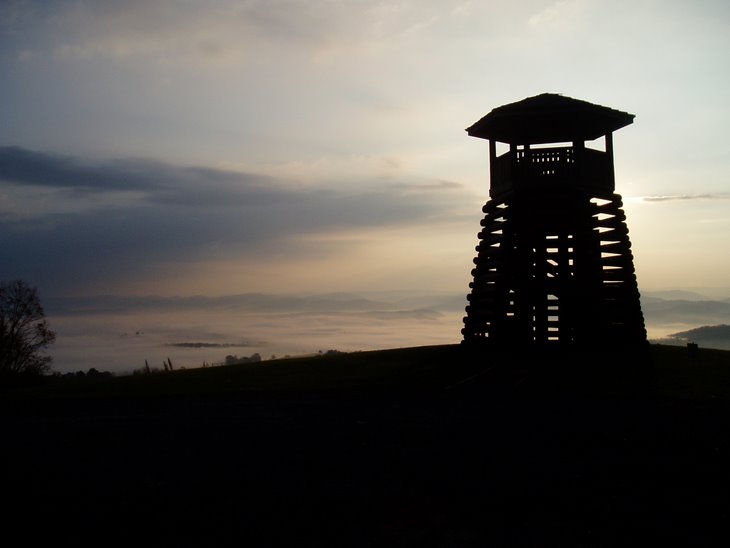Monday, December 19, 2005
The New PCUS???
I have recently found a new website which bills itself as a group of seminary professors and Presbyterian pastors concerned about the schism that is surely to happen this summer in Birmingham. (It can be found here: www.newpcus.org) What I have found through my early perousal is that they look to put together either a "rebirth" of the old PCUS-better known as the Southern church-which merged with the UPCUS-or Northern church-officially in 1983 or to found a whole new denomination if things go badly (which I think they will) at General Assembly this summer. Now those of us who may not have grown up within the boundries of these two denominations and only know the PC(USA) do not really comprehend what makes the PCUS fundamentally different from the PC(USA). (Sorry for the Alphabet Soup.) I have sent my minions out to find out more about the old PCUS and if this is viable to those of us who have grown up within the confines of the PC(USA) and have found it lacking theologically. I will report back with my findings.
Sedition at the Top
Here is a story from Layman.org:
Moderator, stated clerk
blame kidnappings on U.S.
By John H. Adams
The Layman Online
Wednesday, December 7, 2005
Blaming the United States for its military role in Iraq, the leaders of the Presbyterian Church (USA) have made an appeal to Iraqi kidnappers to release four peace activists who are members of a group called Christian Peacemaker Teams (CPT).
"We are gravely concerned about their safety, as well as the safety of all people, both Iraqi and the United States, whose lives have been endangered because of the United States' war against Iraq," said Stated Clerk Clifton Kirkpatrick and General Assembly Moderator Rick Ufford-Chase.
They added, "The General Assembly of the Presbyterian Church (USA) has spoken forcefully about our conviction that there was no justification for the U.S. government's invasion of Iraq. Presbyterians pray daily for the innocent Iraqi civilians, U.S. soldiers, and all others whose lives are at risk at this time. Further, we have spoken clearly about our grave concern for those who have been detained by U.S. forces, and for their families."
The PCUSA leaders' statement was unusually harsh in condemning U.S. involvement in Iraq – even when compared with pleas for the release of the hostages by the National Council of Churches and Islamic groups.
The NCC and Faithful Americans, an organization sponsored by the NCC and comprised of a number of Christian and non-Christian religious groups, issued a joint statement saying, "Like us, they too (members of the CPT) opposed the U.S. attack. They came to serve the Iraqi people. They came not only to urge peace but also to live peace. We who have opposed the U.S. invasion and occupation of Iraq call on all who live in Iraq to seek the release of these people into safety and freedom. And we call on all people of good will everywhere to join in this call."
"Once again, we call for a swift end to the U.S. occupation of Iraq and for peaceful action by the entire human community to assist Iraqis to achieve their own self-government. And we send our loving prayers to those who have become victims of their own loving commitment to peace, justice, and healing."
The NCC and Faithful Americans did not, like the PCUSA, blame the plight of the CPT members on the U.S. involvement in Iraq.
In Palestine, Muslim religious leaders urged the captors of the four Western peace activists to release them unharmed immediately, according to the Islamic Republic News. "We appeal to the captors of these four men to release them unharmed, said the Mufti of Palestine, Ikrema Sabri. "As far as we know, these are innocent people who have done nothing wrong."
In Washington, D.C., the Council on American-Islamic Relationships also called for release of the hostages. In a prepared statement, the group's board chairman, Parvez Ahmed, said, "The hostages in Iraq are longtime friends of the Muslim community. On numerous occasions they stood shoulder-to-shoulder with Muslims advocating for their causes -- from forming human-shields in Iraq before the U.S. invasion, to protecting the honor and property of the Palestinian people.
"Those who left the comfort of their homes to advocate for the rights of others that do not share their faith, ethnicity or language should be celebrated and honored by Muslims, not humiliated by being made captives or, God forbid, killed. This is a universal human ideal and a cherished principle of Islam.
"As a leader of the American Muslim community and the head of America's largest Islamic civil liberties group, I make a personal appeal to the captors of the four members of the Christian Peacemakers Teams – release our brothers in humanity immediately and unconditionally. We also make this call to the captors of all those, of any faith, currently held hostage in Iraq."
The Presbyterian leaders alone blamed the "United States' war against Iraq" for endangering the hostages. Currently, there is no "war against Iraq." The U.S. involvement, whether supported or denounced, is focused on protecting a fragile Iraqi democracy against Iraqis and insurgents who oppose democracy.
The four peace activists were kidnapped by a heretofore unknown group, the Swords of Righteousness. The group has said it will kill the four on Thursday if all prisoners in Iraq are not released by then.
The Presbyterian leaders, after emphasizing their opposition to the U.S. role in Iraq, did mildly state their opposition to the kidnappings by the Swords of Righteousness. "We believe that all violence is wrong, and that the action of kidnapping cannot be justified under any circumstance," they said.
Moderator, stated clerk
blame kidnappings on U.S.
By John H. Adams
The Layman Online
Wednesday, December 7, 2005
Blaming the United States for its military role in Iraq, the leaders of the Presbyterian Church (USA) have made an appeal to Iraqi kidnappers to release four peace activists who are members of a group called Christian Peacemaker Teams (CPT).
"We are gravely concerned about their safety, as well as the safety of all people, both Iraqi and the United States, whose lives have been endangered because of the United States' war against Iraq," said Stated Clerk Clifton Kirkpatrick and General Assembly Moderator Rick Ufford-Chase.
They added, "The General Assembly of the Presbyterian Church (USA) has spoken forcefully about our conviction that there was no justification for the U.S. government's invasion of Iraq. Presbyterians pray daily for the innocent Iraqi civilians, U.S. soldiers, and all others whose lives are at risk at this time. Further, we have spoken clearly about our grave concern for those who have been detained by U.S. forces, and for their families."
The PCUSA leaders' statement was unusually harsh in condemning U.S. involvement in Iraq – even when compared with pleas for the release of the hostages by the National Council of Churches and Islamic groups.
The NCC and Faithful Americans, an organization sponsored by the NCC and comprised of a number of Christian and non-Christian religious groups, issued a joint statement saying, "Like us, they too (members of the CPT) opposed the U.S. attack. They came to serve the Iraqi people. They came not only to urge peace but also to live peace. We who have opposed the U.S. invasion and occupation of Iraq call on all who live in Iraq to seek the release of these people into safety and freedom. And we call on all people of good will everywhere to join in this call."
"Once again, we call for a swift end to the U.S. occupation of Iraq and for peaceful action by the entire human community to assist Iraqis to achieve their own self-government. And we send our loving prayers to those who have become victims of their own loving commitment to peace, justice, and healing."
The NCC and Faithful Americans did not, like the PCUSA, blame the plight of the CPT members on the U.S. involvement in Iraq.
In Palestine, Muslim religious leaders urged the captors of the four Western peace activists to release them unharmed immediately, according to the Islamic Republic News. "We appeal to the captors of these four men to release them unharmed, said the Mufti of Palestine, Ikrema Sabri. "As far as we know, these are innocent people who have done nothing wrong."
In Washington, D.C., the Council on American-Islamic Relationships also called for release of the hostages. In a prepared statement, the group's board chairman, Parvez Ahmed, said, "The hostages in Iraq are longtime friends of the Muslim community. On numerous occasions they stood shoulder-to-shoulder with Muslims advocating for their causes -- from forming human-shields in Iraq before the U.S. invasion, to protecting the honor and property of the Palestinian people.
"Those who left the comfort of their homes to advocate for the rights of others that do not share their faith, ethnicity or language should be celebrated and honored by Muslims, not humiliated by being made captives or, God forbid, killed. This is a universal human ideal and a cherished principle of Islam.
"As a leader of the American Muslim community and the head of America's largest Islamic civil liberties group, I make a personal appeal to the captors of the four members of the Christian Peacemakers Teams – release our brothers in humanity immediately and unconditionally. We also make this call to the captors of all those, of any faith, currently held hostage in Iraq."
The Presbyterian leaders alone blamed the "United States' war against Iraq" for endangering the hostages. Currently, there is no "war against Iraq." The U.S. involvement, whether supported or denounced, is focused on protecting a fragile Iraqi democracy against Iraqis and insurgents who oppose democracy.
The four peace activists were kidnapped by a heretofore unknown group, the Swords of Righteousness. The group has said it will kill the four on Thursday if all prisoners in Iraq are not released by then.
The Presbyterian leaders, after emphasizing their opposition to the U.S. role in Iraq, did mildly state their opposition to the kidnappings by the Swords of Righteousness. "We believe that all violence is wrong, and that the action of kidnapping cannot be justified under any circumstance," they said.
My First Post
This is the first of many of my rantings on the happenings in the Presbyterian Church (USA). I hope that this site will be helpful to those who read it and infuriating to those who tend the flames of Hell within our denomination.
2006 will be a watershed year for our church. We will either stand together as one in Christ or disintegrate into thousands of churches serving something lesser than the greater glory of Christ. We must ask when we discuss theology: Are we serving our own interests by reproving others for what we see as a path towards damnation? Or do we move with the Spirit towards returning those with whom we disagree to the path of righteousness?
2006 will be a watershed year for our church. We will either stand together as one in Christ or disintegrate into thousands of churches serving something lesser than the greater glory of Christ. We must ask when we discuss theology: Are we serving our own interests by reproving others for what we see as a path towards damnation? Or do we move with the Spirit towards returning those with whom we disagree to the path of righteousness?
Subscribe to:
Posts (Atom)











